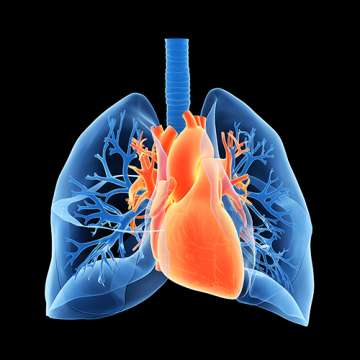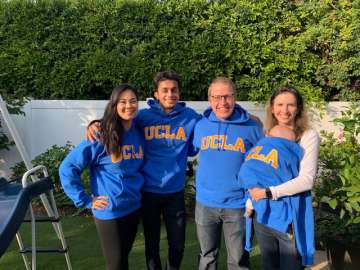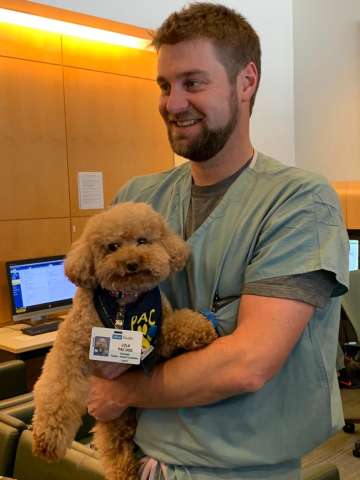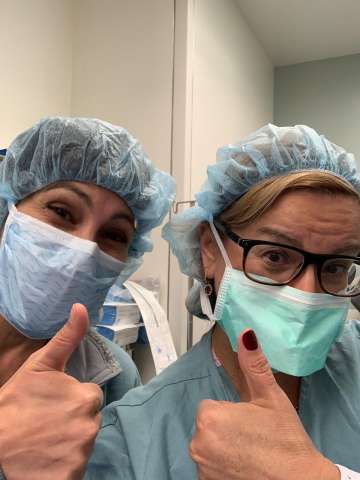Cardiothoracic Anesthesiology

Our mission statement: We care for our patients. We care about each other.
Our values:
- Intellectual curiosity
- Service to others
- Education
- Teamwork
- Humor
- Diversity
- Transparency
The Division of Cardiothoracic Anesthesiology at UCLA is comprised of a diverse group of faculty and fellows who are passionate about patient care, research, and education. We provide patient care for a broad range of contemporary and novel procedures in the fields of cardiothoracic surgery, interventional cardiology, and electrophysiology.
Our areas of expertise include:
- Pediatric and congenital heart disease surgery
- Mechanical support (MCS)
- Heart, lung, and combined organ transplantation
- Robotic cardiac surgery
- Interventional cardiology procedures (TAVR, MitraClip, Melody valve, Watchman)
- Electrophysiology and cardiac implantable electronic devices (CIED)
- Perioperative echocardiography
We have an active clinical and translational research program. Our residents and fellows play an active role in division research. Current projects include:
- Artificial intelligence for hemodynamic monitoring
- Outcomes in pediatric heart surgery
- Health disparities in cardiac surgery
- Postoperative atrial fibrillation
- Dysphagia
- Echocardiography education
- Lung transplantation
- Regional anesthesia in cardiac surgery
- Teamwork and simulation
- Diastology
- Liver transplantation
- ERAS
- Perioperative genomics
As cardiothoracic anesthesiologists, our primary goals are to provide the best and safest clinical care for patients undergoing complex cardiac procedures, and to provide excellence in perioperative sedation, anesthesia, monitoring, and resuscitation. We are committed to the educational mission of the David Geffen School of Medicine and strive to provide fruitful experiences for our medical students, residents, and fellows. We are always seeking to improve patient safety, quality, and outcomes through our research endeavors.
All of our cardiothoracic anesthesiology faculty members have primary board certification by the American Board of Anesthesiology and have completed an additional year of fellowship training in cardiothoracic anesthesiology. In addition, each faculty member has achieved secondary board certification by the National Board of Echocardiography in Advanced Perioperative Transesophageal Echocardiography (TEE). Selected members of our faculty have additional subspecialty fellowship training in critical care or pediatric cardiothoracic anesthesia.
As academic anesthesiologists and leaders within our department and UCLA Health, our faculty members are nationally recognized for research in echocardiography and cardiac physiology. We strive to further the academic mission of cardiothoracic anesthesiology on a national level by participating in subspecialty committees, and by speaking at international meetings of the American Society of Anesthesiology and the Society of Cardiovascular Anesthesiologists.
At Ronald Reagan-UCLA Medical Center, we provide services for over 1000 cardiac surgical cases, over 300 thoracic surgical cases, and over 500 interventional cardiology and electrophysiology procedures per year. On any given day, we staff three cardiac operating rooms, one or two thoracic operating rooms, two to four cardiac catheterization laboratories, one or two hybrid operating rooms, and a 24-bed cardiothoracic intensive care unit (CTICU).
Adult Cardiothoracic Surgery
We provide anesthetic services for over 900 cases requiring cardiopulmonary bypass per year. These cases include coronary artery bypass grafting, heart valve repair or replacement, minimally invasive and robotic cardiac surgery, and surgery of the thoracic aorta.
Pediatric and Adult Congenital Heart Disease Surgery
Pediatric cardiothoracic anesthesiologists, after an additional year of fellowship training, care for the sickest children in the hospital. At UCLA, we perform over 200 surgeries for congenital heart disease every year, including surgeries on premature infants and neonates. As these children grow into adulthood, we utilize our expertise to provide specialized care for them in the cardiac- and non-cardiac operating room, and the cardiac catheterization laboratories. The Ahmanson/UCLA Adult Congenital Heart Disease Center is one of the few national centers for comprehensive adult congenital heart disease (ACHD) care.
Mechanical Circulatory Support (MCS) Surgery
Patients with severe heart failure may require external mechanical circulatory support (MCS). We provide anesthesia for cardiac and noncardiac surgery in patients with MCS, which may include a broad range of percutaneous devices such as the intra-aortic balloon pump, temporary percutaneous ventricular assist devices, temporary cardiorespiratory support by extracorporeal membrane oxygenation (ECMO), and full support temporary and destination ventricular assist devices (VAD) for left, right, and biventricular failure.
Anesthesia for Heart, Lung, and Combined Organ Transplantation
At UCLA, each year we perform over 70 heart transplantations (OHT), over 100 single- and double lung transplantations (OLT), and several heart-lung, lung-liver, and heart-liver transplantations in the adult and pediatric patient population. Our cardiothoracic anesthesia teams are intimately involved in the perioperative management of these complex patients.
Advanced Cardiac Interventional Services
Technological advances have now allowed many cardiac diseases to be treated without surgery. At UCLA, the cardiac anesthesiology team cares for patients undergoing percutaneous left atrial appendage closure, transcatheter aortic valve replacements (TAVRs), transcatheter pulmonary valve replacements, and transcatheter valve repair for mitral or tricuspid regurgitation.
Electrophysiology and Cardiac Implantable Electronic Devices (CIED) Services
As cardiac anesthesiologists, we deliver services to over 350 electrophysiology procedures in specialized cardiac catheterization laboratories. Procedures include permanent pacemaker and intracardiac device implantations, as well as atrial and ventricular arrhythmia ablations. In the perioperative arena, we also manage pacemaker and intracardiac device interrogations and reprogramming.
Perioperative and Interventional Echocardiography Service
Our dedicated perioperative echocardiography service offers diagnostic and procedural guidance by TEE in emergent, urgent, and elective settings for:
- Electrophysiology procedures
- Hybrid cardiac catheterization-OR cases
- The perioperative OR setting including liver transplantation
- The intensive care units.
For immediate care needs, the team offers prompt transthoracic echocardiography (TTE) by attending cardiothoracic anesthesiologists and certified echocardiography technicians. Our non-cardiac faculty anesthesiologists can request bedside TTE whenever there is a question about a patient’s cardiac condition before, during, or after surgery. With the latest technical equipment and our dedicated perioperative echocardiography laboratory, we can offer excellence in clinical service, education, research, and quality to our patients and fellows.
Cardiothoracic Intensive Care Unit (CTICU)
The 24-bed, high-acuity CTICU provides care for all patients undergoing cardiothoracic surgery, heart and lung transplantation, and those on mechanical circulatory assist devices, including pre-lung transplant candidates requiring ECMO. Dually trained, several of our cardiothoracic faculty anesthesiologists are part of the highly skilled critical care anesthesiology team managing these patients around the clock. With close teamwork between cardiothoracic and critical care anesthesiology, we assure the best in patient safety, care, and fellowship education.
Current Research
Echocardiography
Our echocardiography projects have included investigation into the effectiveness of simulator training in learning basic transthoracic imaging. We have also used more advanced echocardiographic measures of cardiac mechanics to describe the effects of cardiac surgery on heart function, and to predict patient outcomes. Ongoing projects involve the clinical applications of 3D imaging, 3D and conventional strain imaging, and perioperative diastolic function assessment in a variety of perioperative procedural settings.
Effect of lung transplantation on right ventricular performance
UCLA is a nationally recognized center for lung transplantation. Many patients presenting for lung transplants have elevated pulmonary artery pressures and impaired right ventricular function. Previous studies have demonstrated variable improvements in function following transplantation. We are studying whether right ventricular function before surgery predicts improvement in heart function and overall outcomes after surgery. The cardiac response to lung transplantation has yet to be fully elucidated, and our goal is for this study to add valuable prognostic information to guide clinical care for this critically ill patient population.
Atrial fibrillation
Our division is actively involved in translational research seeking to predict how and why cardiac surgery is often followed by the onset of atrial fibrillation. Postoperative atrial fibrillation is a significant cause of morbidity and mortality. To improve prediction and treatment of this devastating complication, our clinical faculty anesthesiologists are collaborating with basic science researchers in the Division of Molecular Medicine. Their work investigates epigenomic mechanisms of cardiovascular disease with the goal of finding DNA methylation biomarkers to predict postoperative atrial fibrillation. This novel research seeks to minimize adverse patient outcomes by predicting them prior to surgery and enabling clinicians to personalize patient care.
Perioperative genomics
The Human Genome Project was expected to usher in a new renaissance in science and medicine. It has now been 14 years since the completion of this project, and while advances in science have been made, the translation to clinical medicine has been slow. Initial obstacles to this growth included the high cost of sequencing and the painstaking task of integration with clinical data. Now, with advances in technology and the use of electronic medical records, we have the tools to capitalize on the accomplishments of the Human Genome Project. The UCLA Health system recently announced the launch of its Institute of Precision Medicine, tasked with integrating genomic information into the diagnostic and therapeutic management of patient care. Our division will be at the forefront of this initiative.
Our job will be developing one of the core components of the institute: perioperative genomics. As perioperative physicians, we face new challenges to patient care in an era of increasing surgeries, constrained resources, patients with complex and critical illnesses, and an aging population. Genomics has the potential to provide us with the tools necessary to overcome these challenges and continue to provide a high level of care to our patients. If we can understand the contribution of genetics to the outcomes of our patients, we may be able to anticipate how each individual patient will respond to the numerous stresses and pharmacological exposures of the perioperative period. Phenotypes that will be specifically addressed include responses to therapeutic techniques such as spinal cord stimulation. Different phenotypes affect reactions to common drugs used in the perioperative arena such as pain medications, anesthetics, anticoagulants, and drugs used to augment the cardiovascular system. Other areas of interest include assessing the perioperative risk for complications such as stroke, myocardial infarction, acute kidney injury, bleeding, arrhythmias, cognitive decline, and sepsis. We are proud to play a pivotal role in the Institute of Precision Medicine as we acknowledge the tremendous impact of genomics on the future of medicine.
Resident Education
During their months of rotation on cardiothoracic anesthesiology, residents are exposed to all aspects of pediatric and adult cardiac disease, and the issues involved in providing anesthesia for these patients. All UCLA anesthesia residents learn to perform and interpret focused TTE exams. They receive a two-week foundation in TTE during the PACU rotation. This includes training on a transthoracic echocardiography simulator, and supervised patient exams guided by our ultrasonagrapher and physicians. The resident experience includes our active extracorporeal membrane oxygenation (ECMO) and ventricular assist device (VAD) program, associated with the heart and lung transplantation service.

Fellowship Training
We invite applications to our fellowship programs in cardiothoracic anesthesiology and pediatric cardiac anesthesiology.
Our Physicians
Division Director
Faculty:
- Andrew Disque, MD, MS
- Matthew Fischer, MD
- Reed Harvey, MD, Program Director, Cardiac Anesthesia Fellowship
- Marisa Hernandez-Morgan, MD, MPP
- Jonathan Ho, MD, Director of UCLA Interventional Cardiovascular Operations
- Lorraine Lubin, MD
- Jure Marijic, MD
- Emily Methangkool, MD, Vice Chair for Quality & Safety
- Komal Patel, MD
- Sophia Poorsattar, MD
- Louis Saddic, MD, PhD
- Ali Salehi, MD
- Michael Sopher, MD
- Christine Trieu, MD
- Tiffany Williams, MD, PhD
- Christopher Wray, MD

